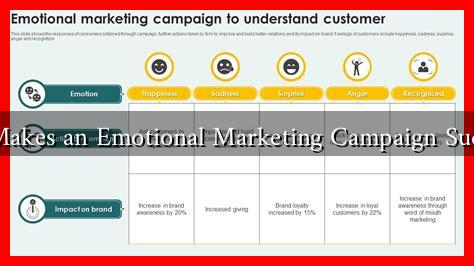-
Table of Contents
What Makes an Emotional Marketing Campaign Successful
Emotional marketing is a powerful tool that taps into the feelings and sentiments of consumers, creating a connection that goes beyond mere transactions. When executed effectively, emotional marketing campaigns can lead to increased brand loyalty, higher engagement rates, and ultimately, greater sales. But what exactly makes an emotional marketing campaign successful? In this article, we will explore the key elements that contribute to the success of these campaigns, supported by examples and statistics.
Understanding Emotional Marketing
Emotional marketing leverages the psychological triggers that influence consumer behavior. By appealing to emotions such as happiness, sadness, fear, or nostalgia, brands can create memorable experiences that resonate with their audience. According to a study by the American Marketing Association, emotional responses to advertisements can significantly impact consumer decision-making, often more so than rational responses.
Key Elements of Successful Emotional Marketing Campaigns
To create a successful emotional marketing campaign, brands should focus on several key elements:
- Authenticity: Consumers are increasingly savvy and can detect insincerity. Authenticity in messaging fosters trust and builds a genuine connection with the audience.
- Storytelling: Compelling narratives can evoke emotions and make the brand more relatable. A well-told story can engage consumers on a deeper level.
- Targeting the Right Emotions: Different emotions resonate with different audiences. Brands must identify which emotions align with their target demographic and craft their messages accordingly.
- Visual and Auditory Elements: The use of powerful visuals and music can enhance emotional responses. A well-produced video can evoke feelings that text alone cannot.
- Call to Action: Successful campaigns often include a clear call to action that encourages consumers to engage with the brand, whether through sharing, purchasing, or participating in a cause.
Case Studies of Successful Emotional Marketing Campaigns
Several brands have successfully implemented emotional marketing strategies, leading to significant results. Here are a few notable examples:
- Always – #LikeAGirl: This campaign aimed to empower young girls and challenge gender stereotypes. By showcasing the strength and resilience of girls, Always connected emotionally with its audience, resulting in a 76% increase in brand favorability.
- Google – Year in Search: Each year, Google releases a video summarizing the most searched topics, often highlighting human stories of triumph and resilience. These videos evoke nostalgia and reflection, leading to millions of views and shares.
- Apple – Misunderstood: This holiday ad tells the story of a teenager who appears disengaged during family gatherings but is actually creating a heartfelt video for his family. The emotional depth of the narrative resonated with viewers, reinforcing Apple’s brand identity as a facilitator of creativity and connection.
The Impact of Emotional Marketing on Consumer Behavior
Emotional marketing not only enhances brand perception but also influences consumer behavior in measurable ways. According to a study by HubSpot, emotionally connected customers are more than twice as valuable as highly satisfied customers. They are more likely to make repeat purchases and recommend the brand to others.
Furthermore, a report from Nielsen found that ads with emotional content performed twice as well as those with purely rational content. This highlights the importance of integrating emotional elements into marketing strategies to drive engagement and conversion.
Conclusion
In conclusion, successful emotional marketing campaigns are built on authenticity, storytelling, and a deep understanding of the target audience’s emotions. By leveraging these elements, brands can create powerful connections that resonate with consumers, leading to increased loyalty and sales. As demonstrated by various case studies, the impact of emotional marketing is profound, making it an essential strategy for brands looking to stand out in a crowded marketplace. As marketers continue to evolve their strategies, the ability to connect emotionally with consumers will remain a cornerstone of effective marketing.

